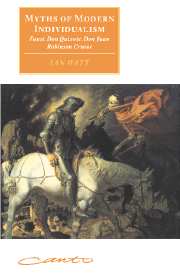Book contents
- Frontmatter
- Contents
- Preface
- Introduction
- Part I THREE RENAISSANCE MYTHS
- 1 From George Faust to Faustbuch
- 2 The Tragicall History of the Life and Death of Doctor Faustus
- 3 Don Quixote of La Mancha
- 4 El Burlador and Don Juan
- 5 Renaissance Individualism and the Counter-Reformation
- Part II FROM PURITAN ETHIC TO ROMANTIC APOTHEOSIS
- Part III CODA: THOUGHTS ON THE TWENTIETH CENTURY
- Appendix The worldwide diffusion of the myths
- Index
5 - Renaissance Individualism and the Counter-Reformation
Published online by Cambridge University Press: 24 November 2009
- Frontmatter
- Contents
- Preface
- Introduction
- Part I THREE RENAISSANCE MYTHS
- 1 From George Faust to Faustbuch
- 2 The Tragicall History of the Life and Death of Doctor Faustus
- 3 Don Quixote of La Mancha
- 4 El Burlador and Don Juan
- 5 Renaissance Individualism and the Counter-Reformation
- Part II FROM PURITAN ETHIC TO ROMANTIC APOTHEOSIS
- Part III CODA: THOUGHTS ON THE TWENTIETH CENTURY
- Appendix The worldwide diffusion of the myths
- Index
Summary
A NOTE ON INDIVIDUALISM
The terms individual and individuality derive from the Latin individuus, meaning “undivided.” or “undividable.” They came to English via medieval French and were apparently first used in the early seventeenth century. Under its definition of “individual” as “characteristic of a single human being,” the Oxford English Dictionary quotes Francis Bacon: “As touching the Manners of learned men, it is a thing personall and individuall.”
The first important discussion of the concepts involved in the terms individual and individuality occurs in the still classic study by Jacob Burckhardt Die Kultur der Renaissance in Italien [The civilization of the Renaissance in Italy] (1860). The second of six parts of that work, entitled “The Development of the Individual,” focuses on the contrast between, on the one hand, the people of earlier societies and, on the other, an unprecedented flowering of the “free personality” in Renaissance Italy, particularly in Florence. Before the Renaissance, Burckhardt proposes, man was “conscious of himself only as a member of a race, people, party, family or corporation – only through some general category.” It was in Italy that this “veil first melted into air. An objective treatment of the state and of all things of this world became possible. The subjective side at the same time asserted itself, with corresponding emphasis; man became a spiritual individual, and recognized himself as such.” Burckhardt's supporting arguments here are certainly open to objection in the light of later scholarship, but his theory is amply fleshed out in the book as a whole.
- Type
- Chapter
- Information
- Myths of Modern IndividualismFaust, Don Quixote, Don Juan, Robinson Crusoe, pp. 120 - 138Publisher: Cambridge University PressPrint publication year: 1996



